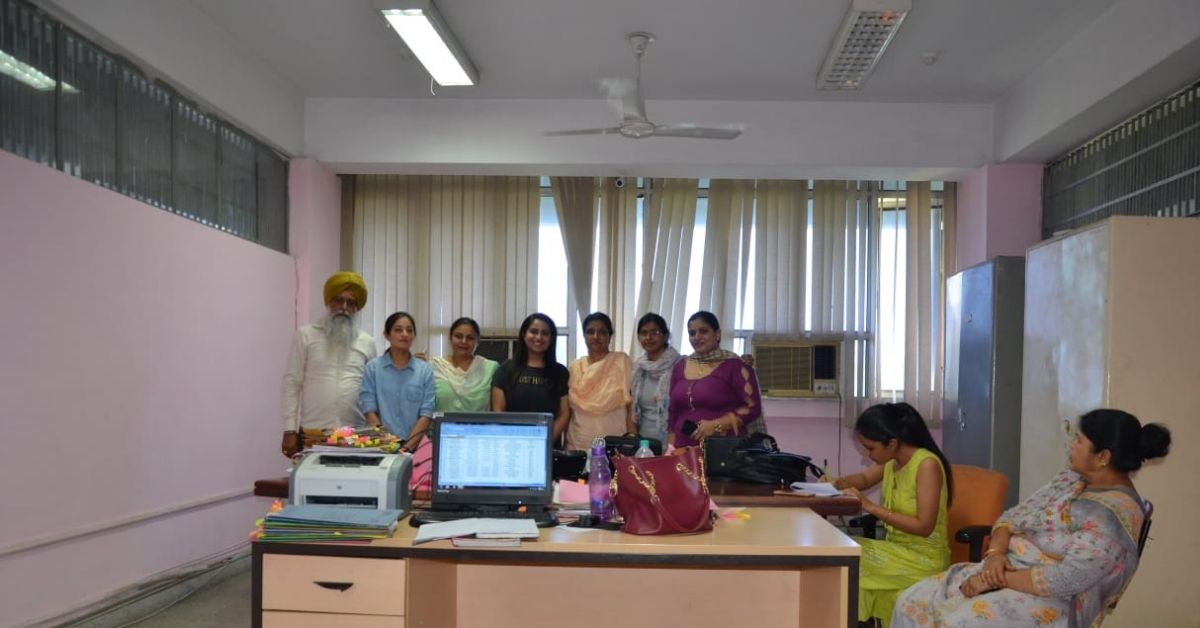In Room 305 in Chandigarh’s Regional Passport Office, Reena and Amrit sit together to sift through piles of documents. The room is abuzz with activity, as the women scan through various applications, overlook the filing of several FIRs, and maintain a carefully curated list of names to be taken to regional passport officer (RPO) Sibash Kabiraj.
These young women are on a mission — to deliver justice to brides deserted by absconding NRI husbands. And as Reena notes, this is all thanks to the efforts of the IPS officer, who was the first to take up their cause.
Kabiraj (44) is a 1999-batch IPS officer of the Haryana cadre, who has been in the posting since 2017. He has been a rare beacon of hope for women who have been cheated of a decent living by their husbands.
“A group of women first approached me in 2018,” Kabiraj tells The Better India. “They were in great distress. After marriage, their husbands had settled in foreign countries. This is commonplace across Punjab and parts of Haryana. Once the husbands arrive in these foreign countries, they don’t disclose to authorities there that they have spouses back home. In many cases, they end up remarrying. Then they’ll visit home for a few weeks once a year, have a good time and then leave again. But they never take their wives along.”

A fight for justice
He adds, “The real trauma starts once they have kids with their wives back home. The husbands get citizenship outside and then never return. The wives, meanwhile, are either pregnant or already have a kid or two, and the in-laws start mistreating them.”
Kabiraj says, “She’s kept more or less as a servant, deemed worthy of only doing house work. Many times, the in-laws also kick her out of the house. In other cases, the husband and his family will marry one girl, take large amounts of dowry, and then desert her and move on to another woman, without disclosing the existence of his first wife.”
Among these women was Reena (33). “I was married on 25 November 2012 in Kurukshetra. My husband was in the police force. Things were quite good for the first few years. But he had a relative who lived in the US, who himself had married twice — one wife was here and the other was with him in the US. When that relative visited us, he told my husband about the life he was leading, and I think that’s how he was swayed,” she says.
In 2017, Reena’s husband fled to Mexico and arrived in the US illegally. For a month, she didn’t hear from him and had no idea where he was. “A month later, he called me and said he was posted somewhere from work. After that, there was only chaos,” she recalls.
Reena is among a group named TogetherWeCan, which fights for the plight of such women abandoned by absconding husbands, which started as a WhatsApp group of women from Punjab, Haryana and Himachal Pradesh.
“I learned that even women who go with their husbands through the H4 Visa are facing great troubles. Once they arrive in the foreign country, they’re informed by their husband that he already has a wife there, and the dependent woman is given two options — do household chores, or leave,” Reena says.

“In this group, many women told me to keep looking out for the term ‘passport impound’, and do more research on that. After we realised what this term meant, we reached out to Kabiraj sir,” she adds.
When the women came to Kabiraj for help, they were truly helpless, he says. “The courts and NRI Commission were of no help, and the women’s in-laws were either ill-treating them or had kicked them out completely. They had children to care for and no livelihood of their own.”
Kabiraj took it upon himself to help them. As he sat down to look into what could be done, he came across a section in the Passports Act, 1967. “Section 10(3) states that if a summons, warrant or criminal case is pending against an Indian passport holder, then the passport can be impounded or cancelled. But this provision was not too much in use. This is because impounding or cancellation is a very tedious process and involves a large amount of paperwork — you need to have a copy of the warrant, chargesheet, FIR and more. The documents have to be absolutely accurate or the case falls apart in court,” he says.
Women stand together
“When I spoke to the girls, I found that many of them were quite educated — some were CAs, some were doctors and some had even done law. So we made a task force of 10-15 girls and I gave them an office with required facilities. We trained them to take up such cases, taught them how to draw up notices, and how to collect required documents. Documents that were earlier not made available to them by the police were now at their disposal. We coordinated with the police to make sure that happened. These women do 90% of the work and one government official is sent with them to supervise. The final document is then submitted to me and we cancel or impound the passport accordingly,” Kabiraj explains.
After the passport is cancelled, the visa is deemed void. Thereafter, when the accused goes to the passport office to avail of any services, he is deported to India. If one arrives in India with an impounded passport, his passport is immediately confiscated at the airport. “In the last three years, we have impounded and cancelled around 500 passports, and more than 75 such absconding husbands have been arrested,” Kabiraj says. “Many of them have been compelled to return to India and complete their settlements with these women, many have faced criminal trials as well.”
Explaining the steps that Reena and her team take to help a victim, she explains, “When a woman approaches us, we first talk to them and hear them out. Then we take down an application, a copy of the FIR, a Look Out Circular (LOC) and the warrant. To impound the passport, first a notice is sent to the husband. Then, a week later, another 7-day notice is sent. If after all this, the man decides not to comply—which happens more often than not—the passport is impounded.” This is a month-long process, she adds.
Reena recalls, “When we approached sir, he was very appalled by what we were going through. He guided us through the entire process. He told us he had a shortage of manpower, but more than that, he wanted the task force to be able to relate to what we were going through. A regular team would only view our situation as another professional task, which is what sir didn’t want. He truly empathised with us. No one has helped us the way Kabiraj sir has. He sat with us for hours on end, heard us out patiently, listened to us cry and howl about our suffering, helped us get counselling, and constantly motivated us. He told us to view ourselves as fighters and not victims.”
Kabiraj helped Reena and her team hold seminars and reach out to a wider range of women going through the same issues. “We taught other girls how they can help each other attain justice. We could understand each other’s plight. So many women come to us with two-three children and nowhere to go, with no respite, and it’s so heartbreaking to see,” Reena says.
Edited by Yoshita Rao
No comments:
Post a Comment